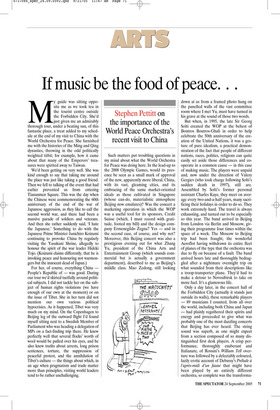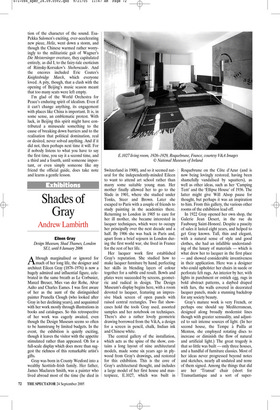If music be the food of peace.. .
Stephen Pettitt on the importance of the World Peace Orchestra’s recent visit to China
My guide was sitting opposite me as we took tea in the tourist centre outside the Forbidden City. She’d just given me an admirably thorough tour, under a beating sun, of this fantastic place, a treat added to my schedule at the end of my visit to China with the World Orchestra for Peace. She furnished me with the histories of the Ming and Qing dynasties, throwing in the odd politically weighted titbit; for example, how it came about that many of the Emperors’ treasures were spirited away to Taiwan.
We’d been getting on very well. She was kind enough to say that taking me around the place was just like taking a good friend. Then we fell to talking of the event that had earlier prevented us from entering Tiananmen Square. This was the day when the Chinese were commemorating the 60th anniversary of the end of the war of Japanese aggression, as they like to call the second world war, and there had been a massive parade of soldiers and veterans. And then she rather suddenly said, ‘I hate the Japanese.’ Something to do with the Japanese Prime Minister Junichiro Koizumi continuing to provoke China by regularly visiting the Yasukuni Shrine, allegedly to honour the spirit of the war leader Hideki Tojo. (Koizumi claims differently, that he is invoking peace and honouring not warmongers but the innocent dead of Japan.) For her, of course, everything China — People’s Republic of — was good. During our tour we’d skirted tactfully around political subjects. I did not tackle her on the subject of human rights violations (we have enough of our own at the moment) or on the issue of Tibet. She in her turn did not mention our own various political hypocrisies. As it happened, Tibet was very much on my mind. On the Copenhagen to Beijing leg of the outward flight I’d found myself sitting next to a Swedish Member of Parliament who was heading a delegation of MPs on a fact-finding trip there. He knew perfectly well that several flocks’ worth of wool would be pulled over his eyes, and he also knew truths about arrests, long prison sentences, torture, the suppression of peaceful protest, and the annihilation of Tibet’s culture — the things about which, in an age when pragmatism and trade matter more than principles, visiting world leaders tend to be rather unchallenging. Such matters put troubling questions in my mind about what the World Orchestra for Peace was doing here. In the lead-up to the 2008 Olympic Games, would its presence be seen as a small mark of approval of the new, apparently more liberal, China, with its vast, gleaming cities, and its embracing of the same market-oriented ideals as those cultivated in Singapore (whose can-do, materialistic atmosphere Beijing now emulates)? Was the concert a marketing operation in which the WOP was a useful tool for its sponsors, Credit Suisse (which, I must record with gratitude, footed my bill) and the design company Ermenegildo Zegna? Yes — and in the second case, of course, and why not? Moreover, this Beijing concert was also a prestigious evening out for what Zhang Yu, president of the China Arts and Entertainment Group (which sounds commercial but is actually a government department), described to me as Beijing’s middle class. Mao Zedong, still looking down at us from a framed photo hung on the panelled walls of the vast committee room where I met Yu, must have turned in his grave at the sound of those two words.
But when, in 1995, the late Sir Georg Solti created the WOP at the behest of Boutros Boutros-Ghali in order to help celebrate the 50th anniversary of the creation of the United Nations, it was a gesture of pure idealism, a practical demonstration of the fact that people of different nations, races, politics, religions can quite easily set aside those differences and cooperate in a common cause — in this case of making music. The players were unpaid and, now under the direction of Valery Gergiev (who took charge following Solti’s sudden death in 1997), still are. Assembled by Solti’s former personal assistant Charles Kaye, they meet on average every two-and-a-half years, many sacrificing their holidays in order to do so. They work extremely hard. The travel is always exhausting, and turned out to be especially so this year. The band arrived in Beijing from London via Berlin and Moscow, giving their programme four times within the space of a week. The Moscow to Beijing trip had been fraught, the wonderful Aeroflot having withdrawn its entire fleet of planes of the type that the orchestra was due to fly on because of a fault. The band arrived hours late and thoroughly bedraggled after a nightmare overnight trip on what sounded from their descriptions like a troop-transporter plane. They’d had to make a detour to Novosibirsk to take on more fuel. It’s a glamorous life.
Only a day later, in the concert hall of the Forbidden City (actually it stands just outside its walls), these remarkable players — 89 musicians I counted, from all over the world, including both China and Japan — had plainly regathered their spirits and energy and proceeded to give what was probably one of the most dazzling concerts that Beijing has ever heard. The string sound was superb, as one might expect from a section composed of so many distinguished first desk players. A crisp performance, thoroughly exuberant and Italianate, of Rossini’s William Tell overture was followed by a delectably coloured, lazily erotic account of Debussy’s Prélude à l’après-midi d’un faune that might have been played by an entirely different orchestra, so complete was the transforma tion of the character of the sound. EsaPekka Salonen’s exciting, ever-accelerating new piece, Helix, went down a storm, and though the Chinese warmed rather worryingly to the militaristic gait of Wagner’s Die Meistersinger overture, they capitulated entirely, as did I, to the fairy-tale exoticism of Rimsky-Korsakov’s Sheherazade. And the encores included Eric Coates’s Knightsbridge March, which everyone loved. A pity, though, that a clash with the opening of Beijing’s music season meant that too many seats were left empty.
I’m glad of the World Orchestra for Peace’s enduring spirit of idealism. Even if it can’t change anything, its engagement with places like China is important. It is, in some sense, an emblematic protest. With luck, in Beijing this spirit might have contributed a minuscule something to the cause of breaking down barriers and to the realisation that political domination, real or desired, never solved anything. And if it did not, then perhaps next time it will. For if nobody listens to what you have to say the first time, you say it a second time, and a third and a fourth, until someone important, or even simply someone like my friend the official guide, does take note and learns a gentle lesson.

































































 Previous page
Previous page